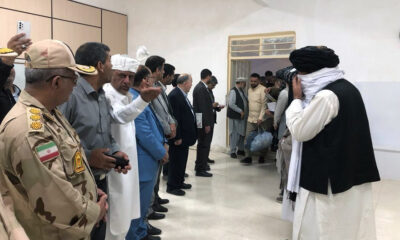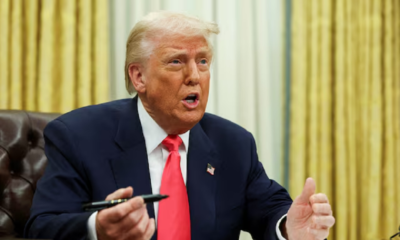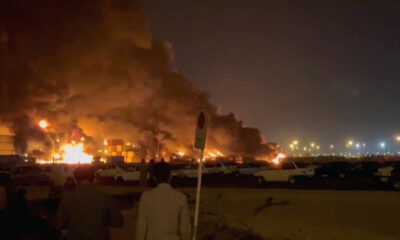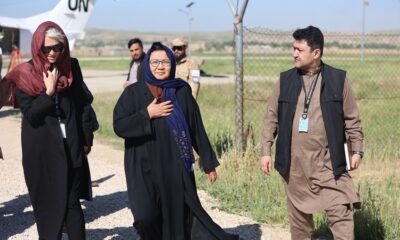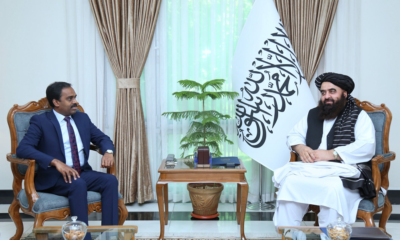Regional
India votes in last phase of massive, 6-week elections
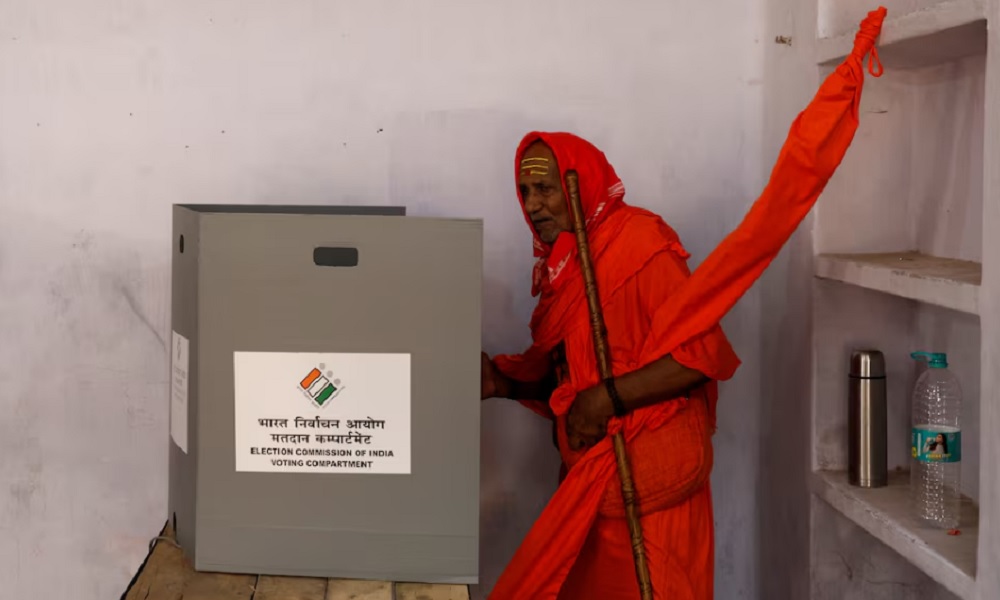
Indians voted in searing summer heat on Saturday in the final phase of the world’s biggest election, as Prime Minister Narendra Modi seeks a rare third term in a poll focussed on inequality and religion.
More than 100 million people are registered to vote for 57 seats across eight states and federal territories in the seventh phase of the election, including in Modi’s constituency in the Hindu holy city of Varanasi, Reuters reported.
“Calling upon the voters to turnout in large numbers and vote,” Modi said as polls opened in the northern state of Punjab and the eastern states of Bihar, West Bengal and Odisha. “Together, let’s make our democracy more vibrant and participative.”
His Hindu-nationalist Bharatiya Janata Party (BJP), battling an opposition alliance of two dozen parties led by Rahul Gandhi’s Congress, is widely expected to keep its majority in the election with more than 1 billion registered voters.
But the BJP has run into a spirited campaign by the opposition “INDIA” alliance, sowing some doubt about how close the race might be.
Public exit polls, banned during the six weeks of voting, are expected to be released after voting ends at 6:30 p.m. (1300 GMT, although they have a patchy record and have sometimes been widely off the mark.
Election results are to be announced on Tuesday.
Scorching summer temperatures with unusually severe heatwaves, have compounded voter fatigue, with at least 33 people killed by suspected heatstroke, including nearly two dozen election officials. Temperatures reached 48 degrees Celsius (118 degrees Fahrenheit) in many voting areas on Saturday.
Unemployment and inflation are the main concerns for voters in the majority-Hindu country of 1.4 billion people.
“We have been enduring a prolonged poll schedule. I pray that it comes to a peaceful end today,” said Sanant Basu, a resident of West Bengal’s capital Kolkata, as sporadic violence marred voting in at least two seats.
People queued early outside polling stations in parts of Punjab state, where farmers have been protesting for minimum price guarantees for their crops.
Sarabjeet Kaur, 51, said she was dismayed by all the mainstream parties. “No party is bothered about us until elections arrive every five years.”
Harpreet Singh, 32, from Punjab’s Firozpur said, “BJP will not be successful here. It’s bye-bye to Modi this time, Congress will be winning.”
Modi began his re-election campaign by focussing on his achievements over the last 10 years but soon switched to mostly targeting the Congress by accusing it of favouring India’s minority Muslims, which the party denies.
The opposition has largely campaigned on affirmative action and saving the constitution from what they call Modi’s dictatorial rule, an allegation the BJP denies.
Regional
Death toll from blast at Iran’s Bandar Abbas port rises to 40
Government spokesperson Fatemeh Mohajerani cautioned against “premature speculation”, saying final assessments would be shared after investigations.
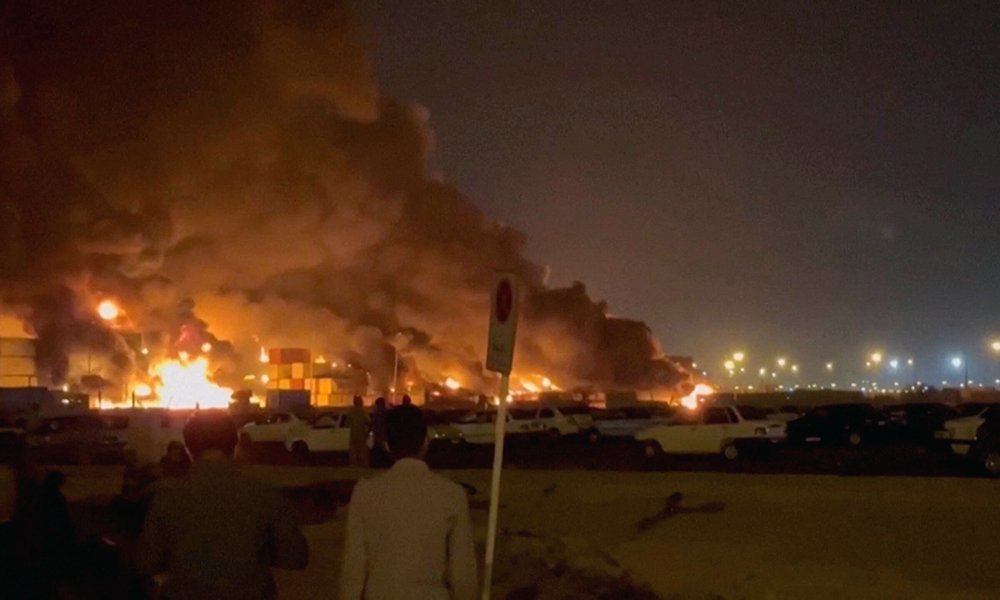
The death toll from a powerful explosion at Iran’s biggest port of Bandar Abbas has risen to at least 40, with more than 1,200 people injured, state media reported on Sunday, as firefighters worked to fully extinguish the fire, Reuters reported.
Saturday’s blast took place in the Shahid Rajaee section of the port, Iran’s biggest container hub, shattering windows for several kilometres around, tearing metal strips off shipping containers and badly damaging goods inside, state media said.
The incident occurred as Iran held a third round of nuclear talks with the United States in Oman.
Fires kept breaking out in different parts of the affected area as of Sunday night, according to state media, with helicopters and fire fighters continuing efforts to extinguish them.
Chemicals at the port were suspected to have fuelled the explosion, but the exact cause was not clear and Iran’s Defence Ministry denied international media reports that the blast may be linked to the mishandling of solid fuel used for missiles.
A spokesperson for the ministry told state TV the reports were “aligned with enemy psyops”, saying that the blast-hit area did not contain any military cargo.
The Associated Press cited British security firm Ambrey as saying the port in March had received sodium perchlorate, which is used to propel ballistic missiles and whose mishandling could have led to the explosion.
The Financial Times newspaper reported in January the shipment of two Iranian vessels from China containing enough of the ingredient to propel as many as 260 mid-range missiles, helping Tehran to replenish its stocks following its direct missile attacks on its arch-foe Israel in 2024.
Plumes of black smoke rose above the site on Sunday and pieces of twisted metal and debris lay scattered across the blast site, read the report.
By early afternoon, the head of Iran’s Red Crescent Society told state media the fire was 90% extinguished and officials said port activities had resumed in unaffected parts of Shahid Rajaee.
A spokesperson for the country’s crisis management organisation appeared on Saturday to blame the explosion on poor storage of chemicals in containers at Shahid Rajaee, adding that earlier warnings had highlighted potential safety risks.
Government spokesperson Fatemeh Mohajerani cautioned against “premature speculation”, saying final assessments would be shared after investigations.
Negligence has often been blamed in a series of deadly incidents that have hit Iranian energy and industrial infrastructure in recent years.
“Did we really have to hold the container here for 3-4 months… until we had 120-140 thousand containers stored in this place?”, Iran’s President Masoud Pezeshkian said after arriving in Bandar Abbas on Sunday.
Incidents in the country have included refinery fires, a gas explosion at a coal mine, and an emergency repair incident at Bandar Abbas that killed one worker in 2023.
Iran has blamed some other incidents on Israel, which has carried out attacks on Iranian soil targeting Iran’s nuclear programme in recent years and last year bombed the country’s air defences.
Regional
Panic in Pakistan as India vows to cut off water supply over Kashmir
Islamabad has denied any role and said “any attempt to stop or divert the flow of water belonging to Pakistan … will be considered as an Act of War”.
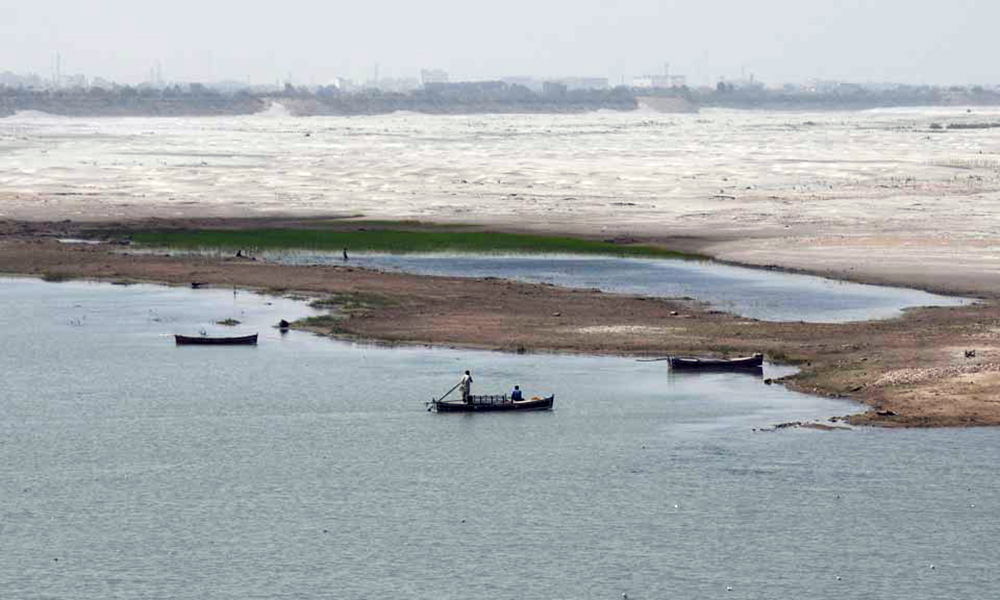
Pakistani farmers have voiced concern about future water supplies after India on Wednesday suspended the World Bank-mediated Indus Waters Tropy of 1960, which ensures water for 80% of Pakistan’s farms.
India said the suspension would last until “Pakistan credibly and irrevocably abjures its support for cross-border terrorism”.
This move comes after last week’s attack in Kashmir. India has accused Pakistan of having been involved, stating two of the three militants who attacked tourists and killed 26 men were from Pakistan.
Islamabad has denied any role and said “any attempt to stop or divert the flow of water belonging to Pakistan … will be considered as an Act of War”.
The treaty split the Indus and its tributaries between the nuclear-armed rivals.
Government officials and experts on both sides say India cannot stop water flows immediately, because the treaty has allowed it to only build hydropower plants without significant storage or dams on the three rivers allocated to Pakistan. But things could start changing in a few months, Reuters reported.
“We will ensure no drop of the Indus River’s water reaches Pakistan,” India’s water resources minister, Chandrakant Raghunath Paatil, said on X.
He did not respond to questions about the fears in Pakistan.
Two Indian government officials, who declined to be identified, said the country could within months start diverting the water for its own farms using canals while planning hydroelectric dams that could take four to seven years to finish.
Immediately, India will stop sharing data like hydrological flows at various sites of the rivers flowing through India, withhold flood warnings and skip annual meetings under the Permanent Indus Commission headed by one official each from the two countries, said Kushvinder Vohra, a recently retired head of India’s Central Water Commission.
“They will not have much information with them when the water is coming, how much is coming,” said Vohra, who was also India’s Indus Commissioner and now advises the government occasionally.
“Without the information, they cannot plan.”
And it is not just agriculture, a shortage of water will also hit electricity generation and potentially cripple the economy, economists say.
Vaqar Ahmed, economist and team lead with UK consulting firm Oxford Policy Management, said that Pakistan had underestimated the threat of India walking away from the treaty.
“India hasn’t got the kind of immediate infrastructure to halt the waterflows, especially during flood times, so this period creates a crucial window for Pakistan to address the inefficiencies in its water sector,” he said.
“There are a lot of inefficiencies, leakages.”
In recent years, Indian Prime Minister Narendra Modi’s government has been seeking to renegotiate the treaty and the two countries have been trying to settle some of their differences in the Permanent Court of Arbitration in the Hague over the size of the Kishenganga and Ratle hydroelectric plants’ water storage area, Reuters reported.
“We can now pursue our projects in free will,” said Vohra.
In a letter on Thursday, India told Pakistan that circumstances had changed since the treaty was signed, including population increases and the need for more cleaner energy sources, referring to hydropower.
Regional
Suspected chemical blast at Iran’s Bandar Abbas port kills at least 18, injures hundreds
President Masoud Pezeshkian ordered an investigation of the incident and sent to the site his interior minister, who said efforts were continuing to extinguish the fire and prevent it from spreading to other areas, read the report.
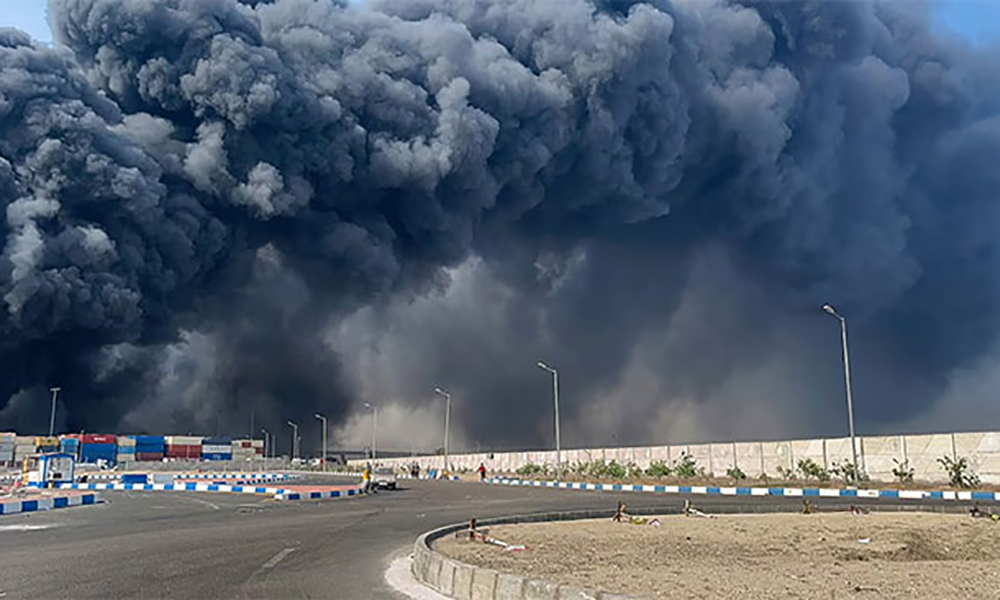
A huge blast probably caused by the explosion of chemical materials killed at least 18 people and injured more than 700 on Saturday at Iran’s biggest port, Bandar Abbas, Iranian state media reported.
The explosion, which hit the Shahid Rajaee section of the port, occurred as Iran began a third round of nuclear talks with the United States in Oman, but there was no indication of a link between the two events, Reuters reported.
Hossein Zafari, a spokesperson for Iran’s crisis management organisation, appeared to blame the explosion on poor storage of chemicals in containers at Shahid Rajaee.
“The cause of the explosion was the chemicals inside the containers,” he told Iran’s ILNA news agency.
“Previously, the Director General of Crisis Management had given warnings to this port during their visits and had pointed out the possibility of danger,” Zafari said.
However, an Iranian government spokesperson said that although chemicals had likely caused the blast, it was not yet possible to determine the exact reason.
President Masoud Pezeshkian ordered an investigation of the incident and sent to the site his interior minister, who said efforts were continuing to extinguish the fire and prevent it from spreading to other areas, read the report.
Iran’s official news channels aired footage of a vast black and orange cloud of smoke billowing up above the port in the aftermath of the blast, and an office building with its doors blown off and papers and debris strewn around.
Located near the strategic Strait of Hormoz, Shahid Rajaee port is Iran’s biggest container hub, handling a majority of the country’s container goods, according to state media.
The blast shattered windows within a radius of several kilometres and was heard in Qeshm, an island 26 kilometres (16 miles) south of the port, Iranian media said.
The semi-official Tasnim news agency posted footage of injured men lying on the road being tended to amid scenes of confusion.
State TV earlier reported that poor handling of flammable materials was a “contributing factor” to the explosion. A local crisis management official told state TV that the blast took place after several containers stored at the port exploded.
As relief workers tried to put out fires, the port’s customs officials said trucks were being evacuated from the area and that the container yard where the explosion occurred likely contained “dangerous goods and chemicals”. Activities at the port were halted after the blast, officials said.
A series of deadly incidents has hit Iranian energy and industrial infrastructure in recent years, with many, like Saturday’s blast, blamed on negligence.
They have included refinery fires, a gas explosion at a coal mine, and an emergency repair incident at Bandar Abbas that killed one worker in 2023.
Iran has blamed some other incidents on its arch-foe Israel, which has carried out attacks on Iranian soil targeting Iran’s nuclear programme in recent years and last year bombed the country’s air defences.
Tehran said Israel was behind a February 2024 attack on Iranian gas pipelines, while in 2020 computers at Shahid Rajaee were hit by a cyberattack. The Washington Post reported that Israel appeared to be behind that incident as retaliation for an earlier Iranian cyberattack, Reuters reported.
Israel has indicated it is nervous about the outcome of U.S.-Iran talks, demanding a full dismantlement of Iran’s nuclear programme. Tehran says the programme is used solely for peaceful purposes, while international observers say it is getting closer to being able to build a bomb.
There was no immediate comment from Israel’s military or Prime Minister Benjamin Netanyahu’s office when asked for comment on whether Israel was in any way involved in Saturday’s explosion.
Oil facilities were not affected by the blast on Saturday, Iranian authorities said.
The National Iranian Petroleum Refining and Distribution Company said in a statement it had “no connection to refineries, fuel tanks, distribution complexes and oil pipelines.”
-

 Sport5 days ago
Sport5 days agoSri Lanka A defeats Afghanistan A by 4 wickets in Abu Dhabi
-

 Business5 days ago
Business5 days agoAfghanistan’s growth prospects remain uncertain amid global uncertainty: World Bank report
-

 Latest News4 days ago
Latest News4 days agoAWCC activates new site in Nangarhar’s Kuz Kunar district
-

 Latest News4 days ago
Latest News4 days agoTarig Ali Bakheet and Japan’s Deputy Foreign Minister discuss Afghanistan’s situation
-

 Business4 days ago
Business4 days agoPakistan’s deputy PM discusses Trans-Afghan Railway Line project with Uzbek FM
-

 Climate Change5 days ago
Climate Change5 days agoPowerful earthquake of 6.2 magnitude shakes Istanbul
-

 Latest News5 days ago
Latest News5 days agoSpecial meeting will be held to launch Afghanistan–Russia joint commission, says Kabulov
-
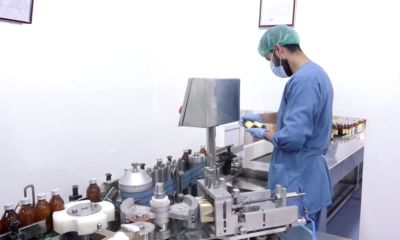
 Latest News3 days ago
Latest News3 days agoAfghanistan’s medicine output reaches 900 types: Pharma Union


